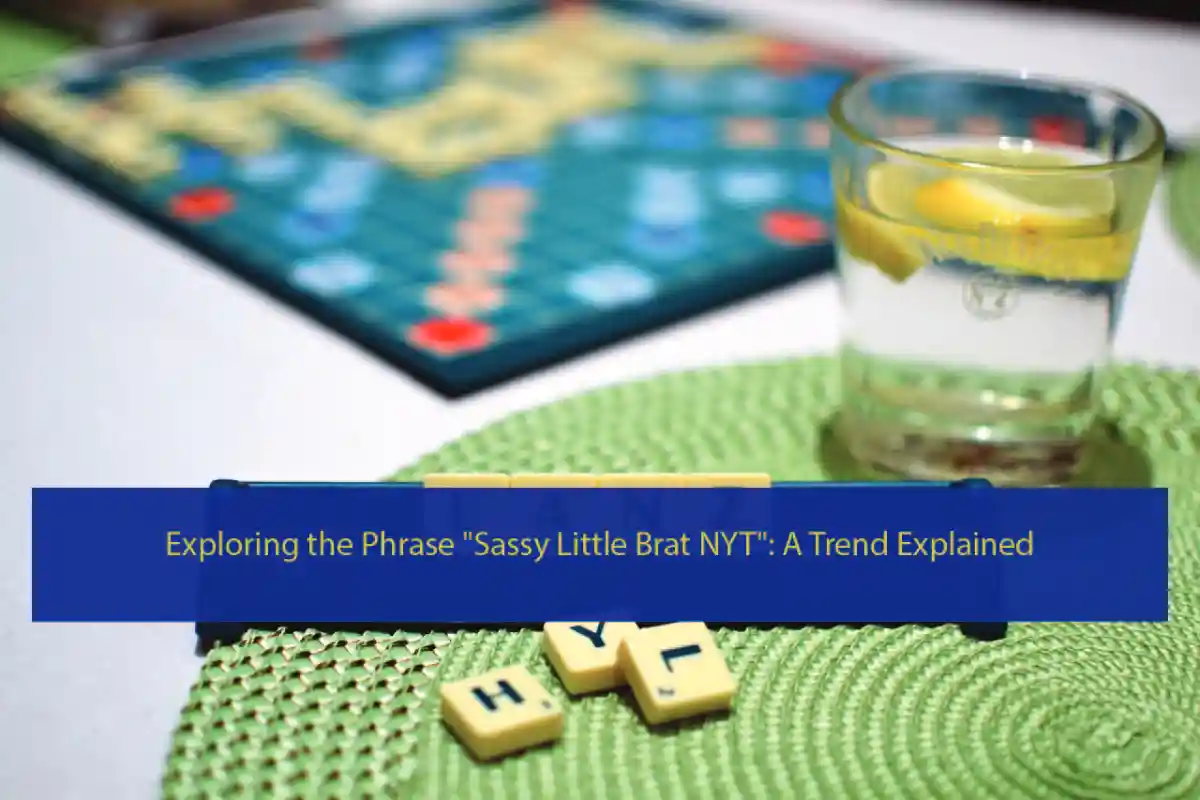Table of Contents
Introduction: What is “Sassy Little Brat NYT”?

The phrase “Sassy Little Brat NYT” may have caught your attention, especially if you came across it in pop culture or social media discussions. While it might sound playful, the phrase can have deeper connotations, depending on its usage and context. In this article, we’ll break down the origins, meanings, and significance of the term “Sassy Little Brat NYT.”
We’ll also explore how and why this phrase has captured attention in various circles, from casual conversations to digital platforms. By the end, you’ll have a comprehensive understanding of what “Sassy Little Brat NYT” means, why it’s become popular, and how it’s used today.
1. Understanding the Word “Sassy”
“Sassy” is a word often used to describe someone who is bold, confident and not afraid to speak their mind. It has a playful side but sometimes can be negative if used to suggest disrespect or impudence. In many cases being called sassy is seen as a compliment especially in modern culture where self-expression and confidence are highly valued.
The word can be interpreted differently depending on the intonation or intent behind its use. When it is combined with “little brat,” however, it takes on a new meaning that I will explore further.
2. What Does “Little Brat” Mean?
Brat refers to a child who is perceived as being spoiled, naughty or difficult to manage. The addition of “little” before “brat” highlights the smallness or immaturity of the person, making them appear more childish.
When we combine the words sassy and little brat together, they form a phrase that implies someone who is cheeky and somewhat mischievous. Such an individual might be confident but also uncontrollable, often crossing boundaries and questioning authority.
3. How the Phrase “Sassy Little Brat NYT” Came to Be
It appears that the phrase Sassy Little Brat NYT has originated from online discussions where people often refer to sassiness mixed with brattish behavior in popular media or even personal interactions. The inclusion of “NYT” may suggest some connection with The New York Times (NYT), possibly referring to a specific article, headline or personality discussed in the newspaper.
However, there is no specific definition of the whole phrase. Some people use “Sassy Little Brat NYT” in a humorous way while others use it to describe characters, celebrities or public figures who are sassy and bratty in public.
4. The Influence of Pop Culture
In today’s world, pop culture greatly impacts language usage. This phrase “Sassy Little Brat NYT” can be associated with how characters in movies, TV shows or books are portrayed. Characters especially younger ones are often written as having strong and bold personalities. These characters are loved for their wit but sometimes they can be seen as “bratty” when their actions become disrespectful or rebellious.
Also, memes and social media trends have helped spread this phrase. People on platforms like Twitter and TikTok refer to some individuals (especially celebrities or influencers) as being ‘sassy little brats’ either because they admire their audacity or dislike their behavior. When “NYT” is added, it may be referring to how such behavior was reported or commented upon by The New York Times or other news outlets.
5. Why Has “Sassy Little Brat NYT” Become Popular?
What factors have led to the growing popularity of the phrase “Sassy Little Brat NYT”? Some of them are:
- Cultural Shifts: In recent years, there has been a greater acceptance of boldness and self-expression, especially among women and younger generations. People who were once called brats are now celebrated for their confidence and assertiveness.
- Media Representation: Audiences love many fictional characters that exhibit sassy and bratty behavior. For example, think about Veronica Lodge from Riverdale or even real-life personalities like Ariana Grande who mix confidence with playfulness.
- Memes and Online Conversations: Social media spreads phrases and slang very fast. The term “sassy little brat” could have come from memes or tweets, thus making it become a trending term.
6. The Role of The New York Times (NYT)
The New York Times may have contributed to the promotion of this through articles or opinion pieces on modern behavior, pop culture figures, or even political personalities described in strong terms such as “sassy little brat.” Known for its comprehensive reporting and cultural commentary, it is possible that a feature or analysis about someone who was deemed sassy or bratty might have inspired the phrase.
7. Usage of “Sassy Little Brat NYT” in Everyday Language
Despite its roots in pop culture and the media, the phrase “Sassy Little Brat NYT” is now used casually in everyday conversations. Here’s how it might be used:
- Affectionate Tone: “Oh, she’s just a sassy little brat, but we love her for it.”
- Criticism: “He’s acting like such a sassy little brat, always demanding attention.”
- Humor: “Look at that sassy little brat on TV, always getting her way.”
People often use the phrase lightheartedly, though it can also be used critically to point out someone’s spoiled or entitled behavior.
8. What Does It Mean to Be a “Sassy Little Brat”?
Being branded as a “sassy little brat” isn’t always negative; it may be indicative of someone’s spirited character, who dares to speak their mind and defy the norms, though sometimes they may be a bit unruly. It is all about self-assuredness and mischief.
In other instances, it can refer to inappropriate or immature behavior. To understand this phrase, one must look at its intent and tone.
9. Why People Identify with “Sassy Little Brat” Behavior
In today’s world where authenticity and assertiveness are increasingly valued, many people—especially younger generations—identify with being “sassy” or “bratty.” For some, these traits are a way to break away from traditional expectations of politeness or subservience. Instead of being seen as disrespectful, these qualities are viewed as expressions of individuality.
10. Is Being a “Sassy Little Brat” a Bad Thing?
If being a “sassy little brat” is negative or not depends on one’s perspective. On one hand, it could be seen as an expression of confidence and strength, particularly when defending oneself. On the other hand, it may be interpreted as disrespect or immaturity.
At the end of the day, the phrase “sassy little brat” means different things to different people. It reminds us that sometimes our actions – whether bold or mischievous – can be read differently depending on who is watching.
Conclusion
In summary, “Sassy Little Brat NYT” is a term with roots in popular culture, online conversations and perhaps media reports. It refers to someone who is daring and self-assured though also a bit naughty or difficult to handle. Even though this phrase can be used both positively and negatively, it ultimately represents cultural shifts towards embracing individuality and self-expression.
Understanding what “Sassy Little Brat NYT” means helps in understanding how language evolves through media, online platforms and casual use. Whether you see it as a playful or derogatory term, it captures contemporary audacity with a touch of defiance.
FAQs
1. What does “Sassy Little Brat NYT” mean?
“Sassy Little Brat NYT” refers to someone who is bold, confident, and mischievous, with the “NYT” possibly referencing a connection to The New York Times or a media portrayal of this behavior.
2. Is being called a “sassy little brat” a compliment?
It depends on the context. In some cases, it can be seen as playful or affectionate, while in others, it might be a criticism of someone’s attitude or behavior.
3. How did the phrase “Sassy Little Brat NYT” become popular?
The phrase likely gained popularity through social media, online memes, and media discussions of bold, rebellious personalities in pop culture.
4. Does the “NYT” in the phrase refer to The New York Times?
While it’s not certain, “NYT” could refer to The New York Times, possibly suggesting media commentary or coverage of individuals with bold, sassy behavior.












